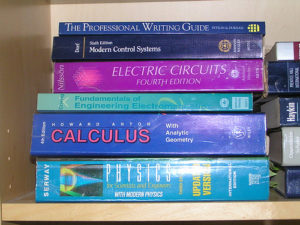
According to an article in The Chronicle of Higher Education, Millenials may be the digital generation but when they are ready to hunker down and study, they’d rather have paperback and hardcover books. Seriously.
The article by Sara Grossman said that while students use e-readers, tablets and mobile devices for more casual reading, a study from the City University of New York revealed that “at least some Millennials still prefer reading long texts and academic selections in print.”
The students in the study were primarily juniors, seniors and graduate students under the age of 25.
Nancy M. Foasberg, a humanities librarian at CUNY’s Queens College and author of the study, told The Chronicle that the survey sample was small, but the overall takeaway was that “’the students in the study really wanted to use print to read for serious academic purposes,” Ms. Foasberg said. “They reported that computers and e-books were ‘fine for less serious work,’ but when they ‘really wanted to get work done,’ they gravitated to print.”
The students complained that embedded links in e-books were too distracting and that they could not highlight or take notes in the margins in the same way they could with print books. Further, the students printed out portions of the textbooks they felt they needed to have in hand, so they ended up spending what they had saved by buying digital books.
The cost of textbooks, however, tends to drive more students to e-readers or tablets, and about 70 percent of students, according to the U.S. Public Interest Research Group, just don’t bother to buy some textbooks at all and scramble to borrow books or find them in the library when they need to study for exams–with mixed results to performance outcomes.
The College Board found that the average student at a four-year public college spends $1,200 on “books and supplies,” nearly $1,250 at a private school.
I have had students who gambled they didn’t need to buy the book and could get by taking detailed notes in class and borrowing a friend’s book, if absolutely necessary. A popular textbook that I have used for years now costs about $100 new and rents for about $45. And I usually require students to buy more than one book for the course.
In fact, depending on the subject, books for one course could easily run $200-$300 and the average student takes five classes per semester. So the College Board estimate is actually quite modest.
Some professors put together “course packets” that contain copies of readings from various sources. The packets are purchased in the student bookstore, but are substantially cheaper than buying a textbook—although the packet can still cost up to about $50 or more per course.
Even with all the digital research and social media at our students’ disposal, there comes a time when having a textbook in hand is the best option.
Buying a textbook might even be steep for a family member to purchase, but if several relatives chip in and buy a gift certificate to the bookstore, or get a list of the required books for the course and order at least one for the student, the idea that the family is investing in and supporting the student’s education may be one of the most meaningful gifts that child receives.
So if you are stumped about finding something genuinely useful for your child, niece, nephew, cousin, sibling or godchild, think textbook.
It may be worth far more than you know.
Jackie Jones, a journalist and journalism educator, is director of the career transformation firm Jones Coaching LLC and author of “Taking Care of the Business of You: 7 Days to Getting Your Career on Track.”


